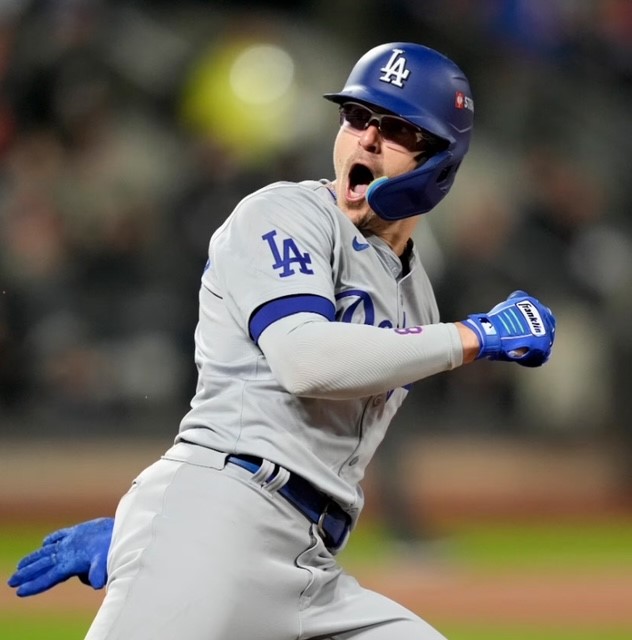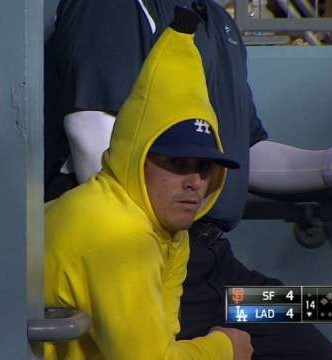
Kiké Hernández Shines When the Lights Are the Brightest
In 2012, I took my son’s travel ball team to a Lancaster Jethawks game. I had arranged for each kid to run out on the field with his positional counterpart in the top of the first inning.
As the kids gathered, the second baseman circled the boys up and told them to sprint to the outfield immediately after the national anthem and high-five the center fielder. The publicity person told the kids not to do it, but at the behest of this fun-loving Jethawk, they did so anyway.
Two years later, that second baseman would make his major league debut with the Houston Astros; and , then he was quickly traded to the Miami Marlins. The next season, after a trade to the Los Angeles Dodgers, he made his postseason debut, going 4-for-13 in the National League Division Series, which the New York Mets won three games to two. That .308 batting average in four games was a sign of things to come for this versatile young ballplayer. Kiké Hernández has made a name for himself in MLB by being a carefree guy who is not afraid to don a banana suit to lighten the mood. More than that, he has made a name for himself by coming through on the biggest stages when the lights are the brightest.
In 1,183 regular-season games so far during an eleven-year career, Hernández has slashed .238/.308/.405, hitting one home run every 32.5 plate appearances. But in the postseason, those numbers go up to .278/.353/.533, with one home run every 17.3 plate appearances. And this is no small sample size—he has done it over 86 games.
When Hernández has been asked the difference between the regular season and the post-season, he has replied that he has the ability to slow his heartbeat. But it has to be more than that. Average players don’t just change into superstars when the calendar flips to October because of their heartbeat.
Here is a brief chart of active player postseason home run totals:
| Player | Home Runs | Plate Appearances |
| Jose Altuve | 27 | 484 |
| Kyle Schwarber | 21 | 278 |
| Alex Bregman | 19 | 434 |
| Corey Seager | 19 | 346 |
| George Springer | 19 | 309 |
| Giancarlo Stanton | 18 | 172 |
| Carlos Correa | 18 | 358 |
| Bryce Harper | 17 | 232 |
| Aaron Judge | 16 | 262 |
| Kiké Hernández | 15 | 259 |
The only name on this list that is remotely similar to Hernández is Alex Bregman, who (a) played in a hitter’s park with a very short porch (the Crawford Boxes in Houston), and (b) has nearly twice as many post-season plate appearances as Kiké. You don’t sit one home run behind Aaron Judge, and two home runs behind Bryce Harper, just by controlling your breathing.
But Hernández wasn’t and hasn’t always been Señor October. After that .308 in the 2015 NLDS, he went hitless in eight at bats in the 2016 National League Championship Series, which the Dodgers lost to the Chicago Cubs.
But in Game 5 of the following year’s NLCS, against the same opponent, Hernández had his coming out party. He crushed three home runs into the Chicago night and raised millions of dollars for hurricane relief for his native Puerto Rico in the process. Over the five-game series, he slashed .444/.546/.1444 with seven RBI. The legend of October Kiké was born.
Unfortunately, after that breakout, Hernández went 8-for-54, with just two home runs and four RBI over his next 21 post-season games in four additional playoff series, slashing .148/.258/.259 in the process. Maybe the hype was just that. But in the Covid year of 2020, after going 0-for-5 in the Division Series, Hernández began a resurgence that has not slowed down.
He slashed .308/.357/.769 for the Dodgers in the 2020 NLCS. Then, after a soft 2-10 in the World Series, he left the Dodgers for the Boston Red Sox. The following year he led the BoSox to Game 6 of the ALCS, going 20-for-49, slashing .408/.423/.837, with five home runs and nine RBI for the entire post-season.
This year Hernández was back with the Dodgers and doing what he does best. Over three series he hit .294 while playing great defense at three prime positions: center field, second base, and third base. And the lights and pressure of New York didn’t cow him one bit: he hit .286 over the NLCS and the World Series while smashing yet another post-season home run.
As of this writing, Hernández is a free agent. But after two highly successful runs with the Dodgers, after winning two World Series titles in Los Angeles, after being the Swiss Army knife willing to play any position—including pitcher—and play them all well above-average, there is a very high likelihood that Kiké is back in Dodger blue next season, and at a salary considerably higher than the $4 million he earned last year.
PLAY BALL!!
